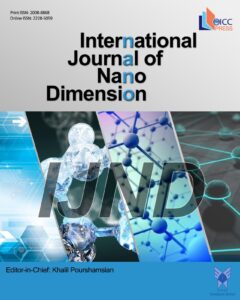Authors
- Department of Chemistry, University of Zanjan, P O Box 45195-313, Zanjan, Iran
- Department of Chemistry, Islamshahr Branch, Islamic Azad University, Tehran, Iran
- Young Researchers Club, Islamshahr Branch, Islamic Azad University, Islamshahr, Iran
- Department of Chemistry, Payame Noor University, P O BOX19395-4697 Tehran, Iran
- School ofMechanical Engineering, Yeungnam University, Gyeongsan 712-749, Republic of Korea
- Nuclear Science and Technology Research Institute, P.O Box 11365-3486, Tehran, Iran
- Protonation of the highly reactive 1:1 intermediates, produced in the reaction between triphenylphosphine and acetylenic esters, by NH-acids such as azathioprine, imidazole or theophylline leads to the formation of vinyltriphenylphosphonium salts, which undergo a Michael addition reaction with a conjugate base to produce phosphorus ylides. Silica nanoparticles (silica NPs were prepared by thermal decomposition of rice hulls) was found to catalyze the conversion of the phosphorus ylides to electron-poor N-vinyl imidazoles in solvent-free conditions under thermal (90◦C, 30 min) conditions. It may be speculated that the polar amphoteric surface (OH groups of the silica NPs) facilitates the interaction of adsorbed weak acidic and basic components due to stabilization of the corresponding transition states and intermediates by H-bonding. It seems that the interactions with the neighboring silanol groups are plausible factors in the rate acceleration. Participation of two proximate silanol groups (one as an H-bond donor and the other as an H-bond acceptor) in the reaction mechanism also seems to be plausible.
Abstract
Protonation of the highly reactive 1:1 intermediates, produced in the reaction between triphenylphosphine and acetylenic esters, by NH-acids such as azathioprine, imidazole or theophylline leads to the formation of vinyltriphenylphosphonium salts, which undergo a Michael addition reaction with a conjugate base to produce phosphorus ylides. Silica nanoparticles (silica NPs were prepared by thermal decomposition of rice hulls) was found to catalyze the conversion of the phosphorus ylides to electron-poor N-vinyl imidazoles in solvent-free conditions under thermal (90◦C, 30 min) conditions. It may be speculated that the polar amphoteric surface (OH groups of the silica NPs) facilitates the interaction of adsorbed weak acidic and basic components due to stabilization of the corresponding transition states and intermediates by H-bonding. It seems that the interactions with the neighboring silanol groups are plausible factors in the rate acceleration. Participation of two proximate silanol groups (one as an H-bond donor and the other as an H-bond acceptor) in the reaction mechanism also seems to be plausible.
Keywords



